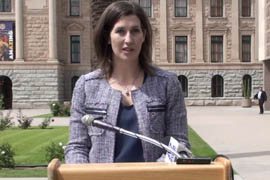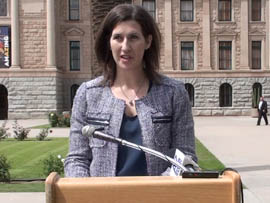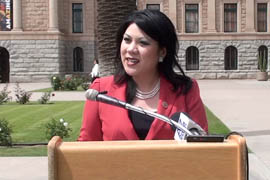Cronkite News has moved to a new home at cronkitenews.azpbs.org. Use this site to search archives from 2011 to May 2015. You can search the new site for current stories.
Report: Arizona slipping behind other states on spending transparency
PHOENIX – Despite increasing online access to government spending information in recent years, Arizona is letting other states move ahead of it in transparency, an advocacy group reported Tuesday.
“Following the Money 2013″ by the Arizona Public Interest Research Group Education Fund gave Arizona a B, down from an A-minus in 2012 but still good enough for 11th best in the country. The report said the state could do more to inform citizens about how economic development tax credits are used.
“The standards for government transparency are increasing every year,” said Serena Unrein, public interest advocate with Arizona PIRG. “Any state that isn’t improving its online transparency will be slipping backwards.”
Unrein was joined by Sen. Kimberly Yee, R-Phoenix, and Stephen Slivinski, senior economist at the Goldwater Institute, an independent watchdog group that promotes limited government and free enterprise.
Yee, who has sponsored several bills promoting government transparency, said the public supports efforts to make spending records more accessible.
“As taxpayers, we deserve to know exactly how our money is being spent and be able to hold local and state decision makers accountable in the manner in which they are spending our money,” Yee said.
Slivinski applauded Arizona’s spending transparency improvements over the last five years but supported offering more information about economic development tax credits. He said continuing to increase transparency will give members of the public information they need to make decisions.
“It doesn’t mean that everyone is going to become a government watchdog, but it means that everyone can become a government watchdog,” Slivinski said.
It is against state law for the Arizona Commerce Authority to disclose information about economic development tax credits, something Unrein said limits citizens from making judgments about government subsidies.
One economic development tax credit in Arizona is the research and development tax credit providing a write-off for companies.
The Arizona Commerce Authority discloses spending information about economic development grants, such as those given through the Arizona Competes Fund, which provides money to attract, expand and retain businesses in Arizona.
“That kind of reporting should really be extended to tax credits so taxpayers know exactly what’s happening with their money and can have confidence that Arizona is getting a good return on its investment for its economic development subsidies,” Unrein said in an interview.
Yee said that in the past there have been privacy concerns at the Legislature about releasing tax credit information.
“I think it needs further study before we open up this kind of legislation because we’ve talked about these types of proposals in the past but there are significant concerns regarding personal information … and I think we should honor those types of concerns,” Yee said.
Unrein said states that release spending information about economic development tax credits haven’t faced privacy concerns.
“Taxpayers should be able to look at that information and have confidence that they’re using it in the best way,” Unrein said.










